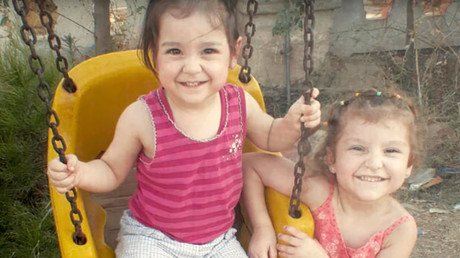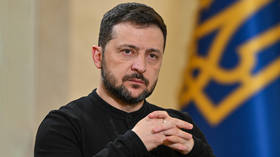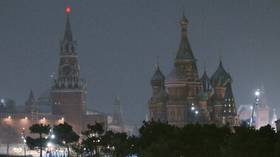‘They shot my mom dead’: RT seeks relatives of Russian-speaking orphan stranded in Iraq
With scars across her face, an injured hand and tear-stained eyes, Mariam struggles to talk about the trauma she has faced. The Russian-speaking girl is in a Baghdad orphanage, and told RT her mother is dead and she doesn’t know where her father is.
Mariam was recently brought to the same orphanage in the Iraqi capital where other Russian-speaking children are being kept after their parents disappeared or were killed.
Her story is one of several that RT has already brought to light through its “Bring them home” campaign, with appeals for anyone with information about the children in the videos to share it at children@rttv.ru.
Mariam can hardly pronounce her name. At first she stayed silent, but then managed to speak of her injuries and the ordeal she suffered when the house she lived in with her family came under fire one day.
'We are waiting you home': Relatives of Russian children in Iraq come forward after RT coverage https://t.co/9shHoqUBaSpic.twitter.com/7Ygoie1EZ5
— RT (@RT_com) August 13, 2017
"Someone began shooting at the house. After that they threw grenades. And this is when the fire started," she says. "Then I was hit by shrapnel. And this is how blood spilled from my head. Lots of blood,” she said, touching scars on her face, apparently left by shrapnel.
Mariam says that her mother was shot dead and she doesn’t know where her father is.
"There were snipers across the river. The snipers shot at my mother right here," Mariam says. "They shot her in the arm. The head and the arm. And then she died."
Hours after RT aired the report about Mariam, a woman from the Russian Republic of Dagestan contacted the channel, claiming that the girl in the video was her granddaughter.
“It's my granddaughter!” the woman identified as Patimatzagra said through tears, adding that her daughter’s name was Madina. She was in shock to hear the girl say that her mother had died.
“The forehead, eyes, eyebrows... The way she [Mariam] speaks – it's all hers. It's her voice! It's Mariam!” she said.
Mariam’s parents took the girl and left Dagestan in 2014, the woman said. From time to time Madina sent her photos and videos of Mariam and two boys, presumably, Mariam’s siblings. However, she stopped answering calls in January this year.
“It’s your granny, Mariam! Don’t be afraid, I’ll take you back!” Patimatzagra said emotionally.
RT has received numerous calls from people who say they recognize Russian-speaking children seen in the video from an orphanage in Baghdad aired earlier in August.
At least four children - two girls and two boys - have been identified by people who say they are relatives.
One other woman said she believes a toddler in the video was her grandson who was born in Iraq, though she only saw pictures of him as a baby, sent by her daughter.
All the people contacting RT shared heart-breaking stories about their sons, daughters and in-laws who fled to join Islamic State (IS, formerly ISIS/ISIL) militants.
RT Editor-in-Chief Margarita Simonyan began raising awareness by issuing an appeal on her Twitter account for people to email RT if they recognize any of the children.
Her call was followed by Chechen leader Ramzan Kadyrov, who posted the RT footage in Russian on his Instagram account last week.
Moscow is now trying to bring several dozen Russian-speaking children from Iraqi orphanages back home. Earlier in August, a four-year-old Chechen boy, Bilal Tagirov, returned to Russia after living with his jihadist father, who was fighting alongside IS in Mosul.
#Russia is actively trying to bring several dozen children from Iraqi orphanages back home https://t.co/ZtRPopQ8A6
— RT (@RT_com) August 14, 2017
On Saturday, Russian Children’s Ombudsman Anna Kuznetsova said that a number of appeals from relatives of children who were taken to Iraq by their radicalized parents has risen since the issue surfaced in the media.
“Many [relatives] attach photos [of these children] to their appeals. These are very tough stories,” she wrote on Instagram.
Some 50 children of Russian citizens are now being held in different Iraqi shelters, Mikhail Fedotov, the head of the Council for Civil Society and Human Rights, told RIA Novosti.














